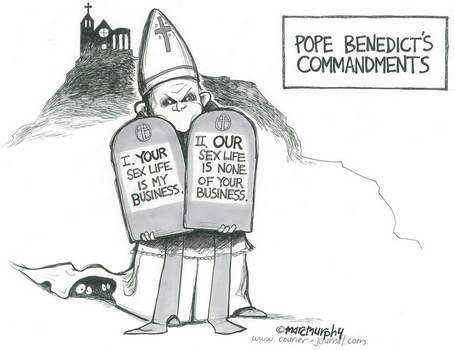It appears Dawkins has no intention of doing what's claimed in the original article.
Geoffrey Robertson's article, referred to by Dawkins.
http://www.guardian.co.uk/commentisfree/libertycentral/2010/apr/02/pope-legal-immunity-international-law
Comment #478580 by Richard Dawkins on April 11, 2010 at 8:48 am
Needless to say, I did NOT say "I will arrest Pope Benedict XVI" or anything so personally grandiloquent. You have to remember that The Sunday Times is a Murdoch newspaper, and that all newspapers follow the odd custom of entrusting headlines to a sub-editor, not the author of the article itself.
What I DID say to Marc Horne when he telephoned me out of the blue, and I repeat it here, is that I am whole-heartedly behind the initiative by Geoffrey Robertson and Mark Stephens to mount a legal challenge to the Pope's proposed visit to Britain. Beyond that, I declined to comment to Marc Horme, other than to refer him to my 'Ratzinger is the Perfect Pope' article here: http://richarddawkins.net/articles/5341
Here is what really happened. Christopher Hitchens first proposed the legal challenge idea to me on March 14th. I responded enthusiastically, and suggested the name of a high profile human rights lawyer whom I know. I had lost her address, however, and set about tracking her down. Meanwhile, Christopher made the brilliant suggestion of Geoffrey Robertson. He approached him, and Mr Robertson's subsequent 'Put the Pope in the Dock' article in The Guardian shows him to be ideal:
http://richarddawkins.net/articles/5366
The case is obviously in good hands, with him and Mark Stephens. I am especially intrigued by the proposed challenge to the legality of the Vatican as a sovereign state whose head can claim diplomatic immunity.
Even if the Pope doesn't end up in the dock, and even if the Vatican doesn't cancel the visit, I am optimistic that we shall raise public consciousness to the point where the British government will find it very awkward indeed to go ahead with the Pope's visit, let alone pay for it.
Geoffrey Robertson's article, referred to by Dawkins.
http://www.guardian.co.uk/commentisfree/libertycentral/2010/apr/02/pope-legal-immunity-international-law
Legal immunity cannot hold. The Vatican should feel the full weight of international law
o Geoffrey Robertson
o guardian.co.uk, Friday 2 April 2010 20.30 BST
Well may the pope defy "the petty gossip of dominant opinion". But the Holy See can no longer ignore international law, which now counts the widespread or systematic sexual abuse of children as a crime against humanity. The anomalous claim of the Vatican to be a state and of the pope to be a head of state and hence immune from legal action cannot stand up to scrutiny.
The truly shocking finding of Judge Murphy's commission in Ireland was not merely that sexual abuse was "endemic" in boys' institutions but that the church hierarchy protected the perpetrators and, despite knowledge of their propensity to reoffend, allowed them to take up new positions teaching other children after their victims had been sworn to secrecy.
This conduct, of course, amounted to the criminal offence of aiding and abetting sex with minors. In legal actions against Catholic archdioceses in the US it has been alleged that the same conduct reflected Vatican policy as approved by Cardinal Ratzinger (as the pope then was) as late as November 2002. Sexual assaults were regarded as sins that were subject to church tribunals, and guilty priests were sent on a "pious pilgrimage" while oaths of confidentiality were extracted from their victims.
In the US, 11,750 allegations of child sex abuse have so far featured in actions settled by archdioceses in Los Angeles for $660m and in Boston for $100m. But some dioceses have gone into bankruptcy and some claimants want higher level accountability two reasons to sue the pope in person. In 2005 a test case in Texas failed because the Vatican sought and obtained the intercession of President Bush, who agreed to claim sovereign (ie head of state) immunity on the pope's behalf. Bush lawyer John B Bellinger III certified that Pope Benedict the XVI was immune from suit "as the head of a foreign state".
Bellinger is now notorious for his defence of Bush administration torture policies. His opinion on papal immunity is even more questionable. It hinges on the assumption that the Vatican, or its metaphysical emanation, the Holy See, is a state. But the papal states were extinguished by invasion in 1870 and the Vatican was created by fascist Italy in 1929 when Mussolini endowed this tiny enclave 0.17 of a square mile containing 900 Catholic bureaucrats with "sovereignty in the international field ... in conformity with its traditions and the exigencies of its mission in the world".
The notion that statehood can be created by another country's unilateral declaration is risible: Iran could make Qom a state overnight, or the UK could launch Canterbury on to the international stage. But it did not take long for Catholic countries to support the pretentions of the Holy See, sending ambassadors and receiving papal nuncios in return. Even the UK maintains an apostolic mission.
The UN at its inception refused membership to the Vatican but has allowed it a unique "observer status", permitting it to become signatory to treaties such as the Law of the Sea and (ironically) the Convention on the Rights of the Child, and to speak and vote at UN conferences where it promotes its controversial dogmas on abortion, contraception and homosexuality. This has involved the UN in blatant discrimination on grounds of religion: other faiths are unofficially represented, if at all, by NGOs. But it has encouraged the Vatican to claim statehood and immunity from liability.
This claim could be challenged successfully in the UK and in the European Court of Human Rights. But in any event, head of state immunity provides no protection for the pope in the international criminal court (see its current indictment of President Bashir). The ICC Statute definition of a crime against humanity includes rape and sexual slavery and other similarly inhumane acts causing harm to mental or physical health, committed against civilians on a widespread or systematic scale, if condoned by a government or a de facto authority. It has been held to cover the recruitment of children as soldiers or sex slaves. If acts of sexual abuse by priests are not isolated or sporadic, but part of a wide practice both known to and unpunished by their de facto authority then they fall within the temporal jurisdiction of the ICC if that practice continued after July 2002, when the court was established.
Pope Benedict has recently been credited with reforming the system to require the reporting of priests to civil authorities, although initially he blamed the scandal on "gay culture". His admonition last week to the Irish church repeatedly emphasised that heaven still awaits the penitent paedophile priest. The Holy See may deserve respect for offering the prospect of redemption to sinners, but it must be clear that in law the pope does so as a spiritual adviser, and not as an immune sovereign.


